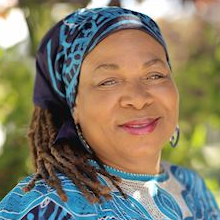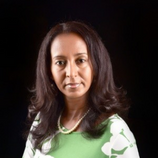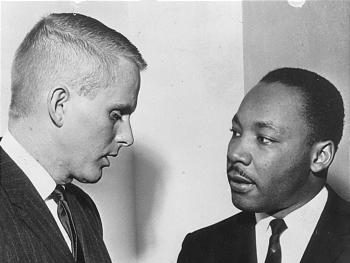6 minute read | By: Claudia Loayza
Dr. Martin Luther King Jr. and Dr. JD Williams of the University of Utah discuss during Dr. King’s visit to Utah in Jan. 1961 | Photo Credit: University of Utah Communications Encyclopedia
“Dr. King brought his vision to Utah on a cold winter night in 1961, but his legacy of unbridled community love and collaboration would inspire and urge action for several generations.”

Dr. King Jr.’s Visit to the Beehive State
Did you know that world renowned civil rights leader Dr. Martin Luther King Jr. visited the Beehive State in January of 1961? Few people may be aware of Utah’s unique claim to Dr. King’s impact, but this was considered a historic visit to Salt Lake City, specifically to the University of Utah campus where he spoke to a buzzing crowd at the Student Union building. Because of a plane delay, he was more than 2 hours late to the engagement. But, with the dedication of local leaders like the late Dr. JD Williams, who organized Dr. King’s visit and then went on to become the first director of the university’s Hinckley Institute of Politics, everyone stayed to hear him speak and be inspired.
Dr. King brought his vision to Utah on a cold winter night in 1961, but his legacy of unbridled community love and collaboration would inspire and urge action for several generations. The seed he planted would also later bloom to inspire local Utahns to take up his charge to create and become a “beloved community” in which everyone is cared for and is absent of poverty, hunger, and hate. Even then he acknowledged that realizing this vision would take time, effort, and resources, but most importantly, it would involve and require everyone to shape that more hopeful future together.


Fastforwarding from 1961 to 1991, the Utah Martin Luther King Jr. Human Rights Commission was established in Utah through executive order by then Governor Norman Bangerter. This commission was charged to uphold Dr. King’s legacy of civil rights and community engagement, and create opportunities to honor MLK Day (made an official state holiday in 2000) through service, constructive conversation, and collaboration. This achievement was a journey pioneered by local civil rights leaders like Dr. Forrest Crawford and Ms. Betty Sawyer, the original founders of the commission.
Today, the MLK Commission celebrates its history and roots. The Utah State Legislature officially codified it into Utah law in 2019, making it an official component of the Utah Division of Multicultural Affairs. This shows that Dr. King’s legacy has always had a home in Utah and it is our lifelong community-builders and current MLK commissioners that take up the mantle to continue building his vision of the “beloved community”. Here are some of their reflections:

“I recall the conversations with Dr. King’s widow, Mrs. Coretta Scott King, and her passion and commitment to make the ‘beloved community’ a reality for all. She charged us to establish MLK Commissions to help carry forth the message of non-violence as members of the ‘beloved community’. The look on young students’ faces when we shared this message in classrooms in the 90’s, was a beautiful reminder of our human capacity to make the ‘beloved community’ a reality and not just another slogan.”
Betty Sawyer, Co-Founder | Utah MLK Jr. Human Rights Commission
“As a member of Utah’s Martin Luther King Jr. Human Rights Commission, especially at this pivotal time in Utah’s history, I remain intrigued, imaginative, and inspired to share in the healing knowledge of Dr. King’s principles and practices with my fellow Utahns toward transformational social change. My vision of Dr. King’s ‘beloved community’ calls for holding individual and collective space for the authentic, courageous reflection and exchange of ideas and perspectives to foster mutual respect, understanding, and a deep recognition of our shared humanity.”
Dr. Tamara Stevenson, Interim Chair | Utah MLK Jr. Human Rights Commission


“My vision for building a beloved community is to build a community that includes diversity grounded on the similarities that we all have and committed to overlook what we may not agree about and build on the love and trust we must have for each other to drown out the hate and fear that surrounds us today.”
Rizvan Gurmu, Commissioner | Utah MLK Jr. Human Rights Commission
Dr. King’s charge to become a more loving, thriving, and supportive society by disrupting harm and raising our voices and actions against injustice continues to this day. Join the ongoing goal and mission of becoming a “beloved community” by connecting with the Utah MLK Jr. Human Rights Commission’s events and opportunities.

